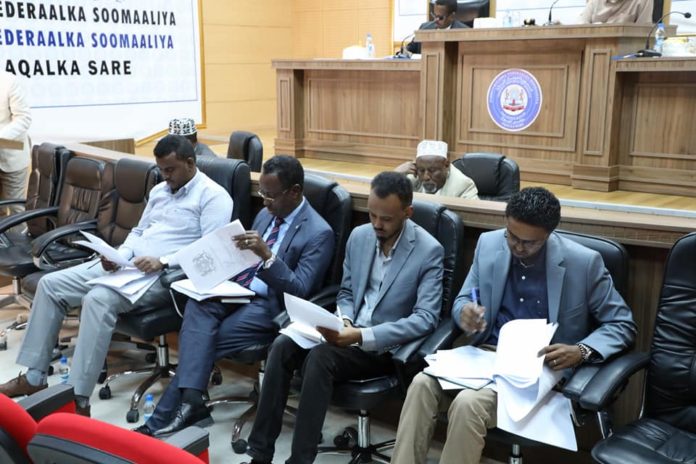The National Union of Somali Journalists (NUSOJ) has filed an application at the Supreme Court of Somalia to challenge the constitutionality of the decision made by the Upper House of the Federal Parliament (Senate) to pass repressive media law on 14th January 2020. Though the application was lodged on 1 February 2020, the President of Supreme Court has just given the greenlight for the case to proceed and parties to appear before the highest court of the land.
“Although we have previously protested at the inclusion (in the new media bill) of certain sneaky and mischievous clauses meant to muzzle and curtail media freedom and frustrate reporting on critical public interest issues, our application is centred around the unconstitutionality of the decision by the Senate to pass the new repressive media law,” said Omar Faruk Osman, NUSOJ Secretary General.
The purported passage of the Media Bill by the Senate not only violated the rules of procedures of the Federal Parliament, but even more egregiously, it offended the constitutional provisions in relation to decision-making in the Upper House of the Federal Parliament. Under Article 76 of the Provisional Constitution of Somalia (Decision-making in the Upper House of the Federal Parliament), clause (2) states that: “Decisions of the Upper House of the Federal Parliament can pass only with a majority vote of the total membership of the Upper House of the Federal Parliament”.
There are currently 54 members of the Senate as per article 72 of the Constitution, indicating that a simple majority is attained when 28 members vote in favour. However, the Senate’s decision on the new media law was legislated when 23 members voted in favour, three (3) voted against it, while there was one (1) abstention. NUSOJ therefore contends that the passage of this new media law was not in line with the provisions of the Provisional Constitution of the Federal Republic of Somalia.
In light of this manifest breach of the constitution, NUSOJ has taken this timely action to petition the Supreme Court of Somalia to declare the Senate’s decision to pass the new media law on 14th January 2020 a nullity in law and fact. The union believes that the Supreme Court will find merit in this case and will declare the Senate’s decision invalid and unconstitutional.
“This action is in defence of our most supreme legislative framework, the provisional constitution of Somalia. It is about defending the rule of law. Our Provisional Constitution must work for all who live in Somalia and any evidence that it is under threat must be met with an appropriate and equally potent legislative response. We are asking the highest court in the land to uphold the constitutionality of decisions made by state organs. This will set the tone and precedent going forward, and will encourage everyone in Somalia to place their confidence in the Constitution and its proper application,” stressed Osman.
“Whilst we recognise the mandate, roles and responsibilities of both Lower and Upper Houses of the Federal Parliament to pass legislation, we however insist that they must discharge their legislative function in line with the constitution. Our supreme law, the constitution, came into being as a result of tireless efforts to ensure the principles of democracy and accountability, along with all the relevant checks and balances are applied throughout all processes related to the state, including Parliament. As citizens and as a union, we expect the parliament and all its members to abide by the spirit and tenets of the Provisional Constitution in its entirety,” added Osman.
“With our deep reservations about what this new media law means for the rights of journalists, the right of freedom of the media, and the right to impart information without political interference, we are unapologetically vigilant about this legislative process. We believe this draft media law will have serious ramifications in Somalia’s transition to democratisation and therefore, it is in national public interest and in the service of good governance that all decisions around it are constitutional,” concluded Osman.

